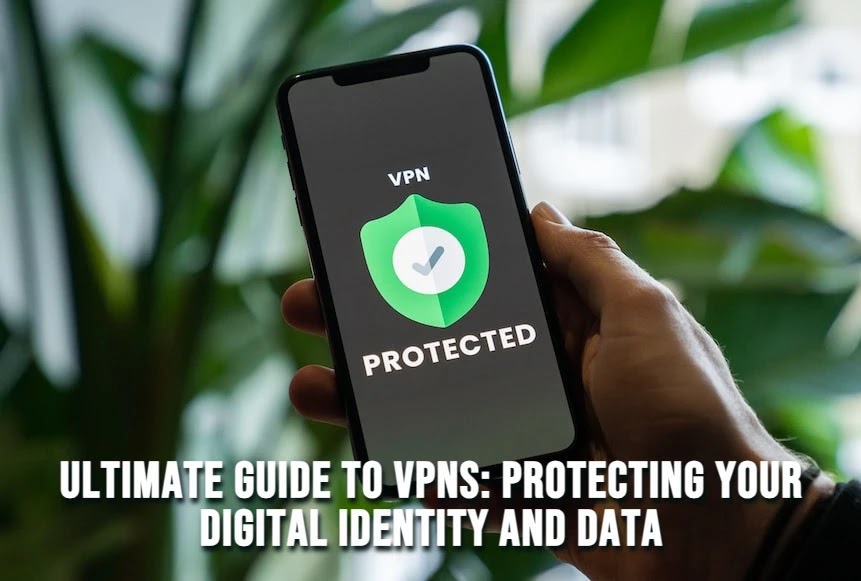The Ultimate Guide to Virtual Private Networks (VPN)
Ultimate Guide to VPNs: Protecting Your Digital Identity and Data
In today’s interconnected digital landscape, it is more important than ever to ensure your online privacy and security. This is where Virtual Private Networks (VPNs) come into play. In this comprehensive guide, we’ll delve deeper into the world of VPNs, exploring their functionalities, benefits, potential drawbacks, and how they can empower you to surf the internet with confidence.
1. What is VPN?
Virtual Private Network (VPN) is a powerful online tool that creates a secure and encrypted connection between your device and a remote server. This connection hides your IP address, effectively hiding your online identity and location. By tunneling your Internet traffic through a VPN server, a VPN provides an additional layer of security and privacy when accessing the Internet.
2. How does VPN work?
At its core, a VPN works by establishing a secure tunnel between your device and the VPN server. This tunnel encrypts your data and prevents it from being intercepted by malicious actors or your Internet Service Provider (ISP). When you connect to the Internet through a VPN, your data is routed through the server, making it appear as if you are accessing the Internet from the server’s location. When you use a VPN for pc, your internet traffic is encrypted and routed through this secure tunnel, ensuring that your data remains confidential and protected from eavesdropping.
3. Benefits of Using a VPN
Using a Virtual Private Network (VPN) offers a variety of benefits that contribute to increased online privacy, security, and convenience. Here are some of the key benefits of using a VPN:
- Advanced Online Security: VPNs encrypt your Internet traffic, making it extremely difficult for hackers, cybercriminals, and malicious entities to intercept or intercept your data. This is especially important when using public Wi-Fi networks, where data interception is a significant risk. Using a secure network and VPN makes it easier to protect yourself from identity theft and similar cyberattacks.
- Privacy Protection: A VPN hides your IP address and assigns you a different IP address from the server you connect to. It helps keep your online activities anonymous and prevents websites, advertisers, and even your ISP from tracking your browsing habits.
- Data Encryption: VPNs use strong encryption protocols to secure your data, ensuring that even if it is intercepted, it remains unreadable and accessible to unauthorized parties.
- Bypassing Geographical Restrictions: VPN allows you to access content and websites that may be restricted or blocked in your current location. By connecting to a server in a different country, you can effectively bypass censorship and access region-specific content.
- Anonymous Browsing: With a VPN, your online activities are masked by the IP address of the VPN server, making it difficult for anyone to trace your online activities. This can be especially useful for maintaining privacy while browsing or downloading.
- Security of Public Wi-Fi: Public Wi-Fi networks are often unsecured, making them prime targets for cybercriminals. A VPN adds an extra layer of security, encrypting your data and protecting you from potential eavesdroppers.
- Secure Online Transactions: When shopping or banking transactions online, using a VPN ensures that your financial information is encrypted and secure, reducing the risk of unauthorized access or fraud.
- Avoid Bandwidth Throttling: Some ISPs may intentionally slow down your Internet connection based on your online activities. Using a VPN can help you avoid this practice, as your ISP will not be able to see what specific websites or services you are accessing.
- Remote Access: VPN allows remote workers to securely access their company’s internal network, applications, and data from anywhere in the world. This is especially valuable for businesses and individuals working remotely.
- Cyber threat protection: VPNs can help protect your data and devices from malware, phishing attacks, and other online threats by creating a secure tunnel for your internet traffic.
- Secure Peer-to-Peer (P2P) File Sharing: If you engage in P2P file sharing, a VPN can provide an additional layer of security and anonymity, reducing the risk of your activities being monitored.
- Avoiding government surveillance: In areas where internet use is heavily monitored or censored, a VPN can help you maintain your online privacy and bypass government-imposed restrictions.
- Unrestricted Streaming: With a VPN, you can access streaming content from different regions, giving you access to the widest range of movies, TV shows, and other media.
- Reduction in online tracking: Advertisers and websites often track your online behavior in order to deliver targeted advertising. A VPN can help reduce such tracking by hiding your IP address and making it harder for third parties to collect data about you.
Overall, using a VPN empowers you to take control of your online experience, protect your privacy, and ensure that your data remains secure and private while navigating the digital world.
4. Types of VPN Protocols
VPNs use different protocols to establish a secure connection. Some popular VPN protocols include:
OpenVPN
Known for its strong security features and versatility, OpenVPN is a widely used open-source protocol.
L2TP/IPSec
Layer 2 Tunneling Protocol (L2TP) combined with IPsec (Internet Protocol Security) provides strong encryption and is often used on mobile devices.
PPTP
Point-to-Point Tunneling Protocol (PPTP) is fast and easy to set up, but it may not be as secure as other protocols.
SSTP
Secure Sockets Tunneling Protocol (SSTP) is often used in Windows environments and provides stronger security.
IKEv2/IPsec
Internet Key Exchange version 2 (IKEv2) with IPsec is known for its stability and speed, which makes it suitable for mobile devices.
5. Choosing the Right VPN Provider
Choosing the right VPN provider is important for a secure and reliable online experience. Consider factors such as:
Factors to Consider
- Reputation and reviews
- Security features
- User-friendly interface
- Customer support
- Cost
VPN Logging Policies
Review the VPN provider’s logging policies to make sure they are in line with your privacy preferences. Choose a provider that keeps minimal or no logs of your online activities.
Server Location
A diverse range of server locations allows you to access content from different regions and enhances your online browsing experience.
Connection Speed and Bandwidth
Choose a VPN provider that offers fast connection speeds and enough bandwidth for your browsing needs.
Device Compatibility
Make sure the VPN is compatible with your devices, including computers, smartphones, and tablets.
6. Setting Up and Using a VPN
Setting up a VPN involves a few simple steps:
- Step 1: Choose a VPN provider and subscribe to a plan.
- Step 2: Download and install the VPN app on your device.
- Step 3: Launch the app and log in.
- Step 4: Choose a server location.
- Step 5: Connect to VPN Server.
Best VPN Providers ( Recommended )
| S. No. | VPN Provider | Official Link |
|---|---|---|
| 01 | Atlas VPN | Check here! |
| 02 | Nord VPN | Check here! |
| 03 | Ultra VPN | Check here! |
| 04 | hide.me VPN | Check here! |
| 05 | Potato VPN | Check here! |
Common VPN Setup Problems and Troubleshooting
- Connection drops
- Slow Speeds
- Compatibility issues
7. Potential Drawbacks of Using a VPN
While VPNs offer many benefits, there are also some potential drawbacks to consider:
Slow connection speed
The encryption process may result in a slightly slower connection speed than a direct connection.
Dependency on VPN Provider
Your online security depends on the reliability of your VPN provider. Choosing a reputable provider is essential.
Legality and Regulation
VPNs may be banned or regulated in some countries. Research the legal implications of using a VPN in your area.
8. VPN and Online Security
VPNs play an important role in enhancing online security:
- Protection from Cyber Threats
VPNs protect your data from cyber threats such as malware, phishing attacks, and man-in-the-middle attacks. - Protect Sensitive Data
When transmitting sensitive information, such as financial details or personal messages, a VPN ensures that data remains confidential.
9. VPN and Privacy
VPNs are essential tools for protecting your online privacy:
ISP Tracking and Data Collection
ISPs often track and collect user data. A VPN prevents ISPs from monitoring your online activities.
Minimize Online Tracking
VPNs hide your IP address, making it difficult for advertisers and websites to track your browsing habits.
Avoid Government Surveillance
In areas with government surveillance, a VPN can provide a layer of protection against intrusive surveillance.
10. The Future of VPN Technology
VPN technology continues to evolve:
Advances in Encryption
As encryption technologies improve, VPNs will provide even stronger protection for user data.
Integration with IoT devices
VPNs will likely become more integrated with Internet of Things (IoT) devices, securing connections to smart homes and wearable technology.
Impact of 5G Technology
The rollout of 5G technology could lead to faster and more reliable VPN connections, increasing overall online security.
Conclusion
In a world where digital threats are ever-present, a Virtual Private Network (VPN) stands out as an important tool to protect your online privacy, security, and freedom. By encrypting your data and allowing you to browse the Internet anonymously, a VPN empowers you to take control of your online presence.
Whether you’re accessing sensitive information, avoiding online tracking, or simply bypassing geographic restrictions, a VPN is your ally in the digital realm. As technology advances, VPNs will continue to adapt and innovate, ensuring that your online experiences remain secure and private.






Thank you so much for your wonderful and insightful share! Every word is packed with valuable thoughts and practical tips that truly broaden my horizons. I’ve gained so much inspiration and will definitely put your advice into practice soon.